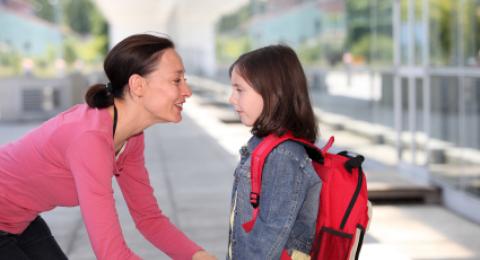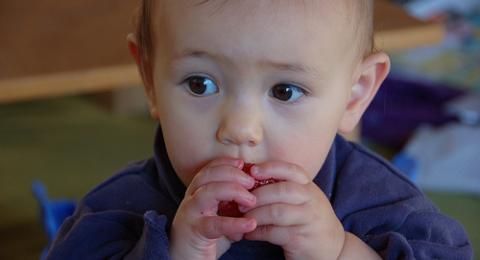For some parents, it’s one of the hardest goodbyes – the day when you leave your five year old at primary school for the first time. It’s no easier when friends gloat about how well prepared their child was, and tell you all the tricks and hints they used to get them used to the idea of ‘big school’. It’s natural to feel worried when friends tell you with glee about their child simply waving goodbye and sending their parents away without a second glance.
No matter how many ‘starting school’ books you read, or how many times you’ve visited the primary school, met the teachers, met the buddies and played in the playground, some children simply find it difficult to adjust to change. All those preparatory steps are valuable and worthwhile, but if they were not enough for your child, what else can be done?
Following are 8 tips to help your child settle at primary school – each of these alone or together will help you and your child ease into the new experience:
- Manage Your Own Anxiety: if your child finds it difficult to adjust to change, it’s natural for you to also feel concerned about them. Avoid sharing your worries with your child by asking questions that might hint at your thoughts. For example, instead of saying “Was it okay at school today? Did you meet any friends? Do you like your teacher?”, you might try “This is what I did today …. So, tell me something interesting about your day, what did you do?” and “What kinds of toys do they have in the classroom?” and “Is there something special in the classroom that you would like to try doing?”
- Remain Empathetic: although it’s best not to share your own worries, it’s important to remain open and expressive about how you think your child might be feeling. So when your child is on the way to school and looks nervous, or starts to cry in the playground, you can let him or her know you empathise: “You’re looking upset. I wonder if you are thinking about saying goodbye?” or “It is hard to get used to a new school, and sometimes it feels lonely to be sitting with new people,” and simply ask your child: “How are you feeling?”
- Listen: to how your child is feeling and validate those feelings – you don’t need to solve the problem or take the situation away – and after all, you can’t, because your child has to start school. However, by listening and letting your child know his or her feelings are normal, you are teaching them to accept themselves and their feelings and letting them know it is okay to talk about them to you. A child whose feelings have been validated is more likely to remain calm, be ready to listen and work with you to find ways to adjust to the new situation.
- Meet Other Parents: try to meet other new parents as soon as possible so that you can organise some afternoon tea or weekend play dates for your child. If you are working, and can’t be in the playground at drop-off time, other options include volunteering to become the class parent, going to P&C meetings, personally dropping your child to early band or choir practice where you may meet other parents, and asking your child’s teacher who would be a good playmate for your child.
- Get Up Early and Turn off the Television: in those early weeks, it’s worthwhile getting yourself and your child up earlier than you might later in the term. Those precious hours of gradually getting ready for school, slowly eating breakfast together, getting used to the routine of packing a bag and putting on a uniform, can make a difference by helping your child feel calm and more ready for saying goodbye. Leave the television off so that you are both focused on enjoying the morning together and ‘getting ready’ – your child does not need extra distractions. If there is spare time, you can use it to get to school earlier for a play, or send your child outside for some active play before he or she has to enter the more structured environment of the classroom.
- Praise Successes: even if your child had a teary start to the day, when you pick him or her up, remind them that even though they were sad to say goodbye, they stayed at school and played and did their best. For example, you can say “I know you were sad to say goodbye this morning, but well done for going into class and doing all those wonderful things today – I love the way you have painted my smile in this painting and the colours you painted on my dress. I wonder what you will paint tomorrow?”
- Work with the Teacher: ask your child’s teacher for support with a routine that will help your child adjust to saying goodbye and entering the classroom. If you think your child needs a little longer with you before saying goodbye, try to get to school earlier to give your child time to talk to you, have their feelings validated and then start a routine with the help of the teacher. For example, you might decide to have your child stand near the front of the line at morning assembly, near you, so the teacher can hold their hand and reassure them when they wave goodbye, or you might have them always line up next to a special friend.
- Be Realistic: if your child does find change difficult, it’s realistic to expect he or she will take a few weeks to adjust to school. Look for small signs of progress, such as a shorter time to say good bye, or less time crying, or happier smiles when you pick your child up – these signs will be gradual but they are worth noting so that you also feel positive about your child’s ability to eventually adjust to school. Many children come home in the first weeks of school feeling grumpy, tired and hungry – if you expect this, and you’re ready with nutritious food and drink, a warm hug, not too many after-school activities and an empathetic ear, you will help your child cope better with his or her new, and often exhausting school routine.
Good luck! Do you have any other tips to share with us?







Leave a Reply